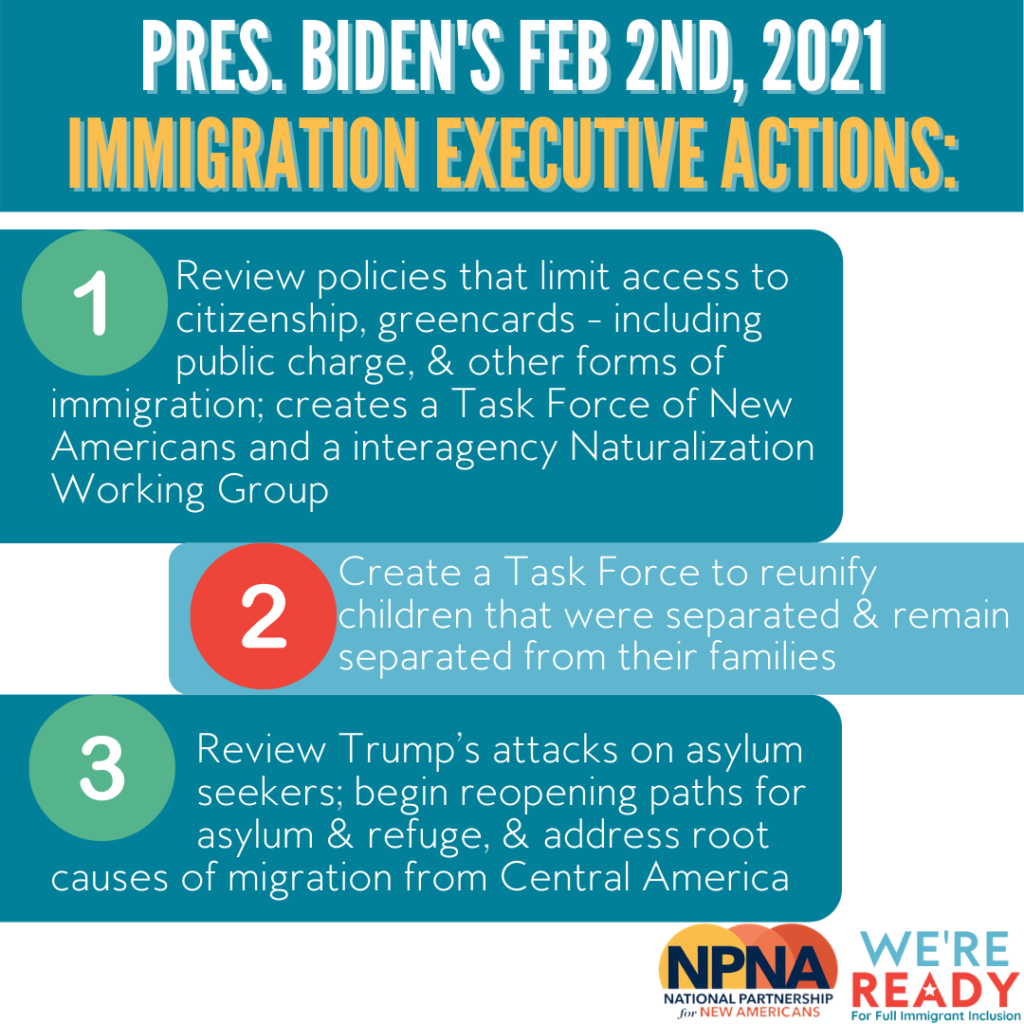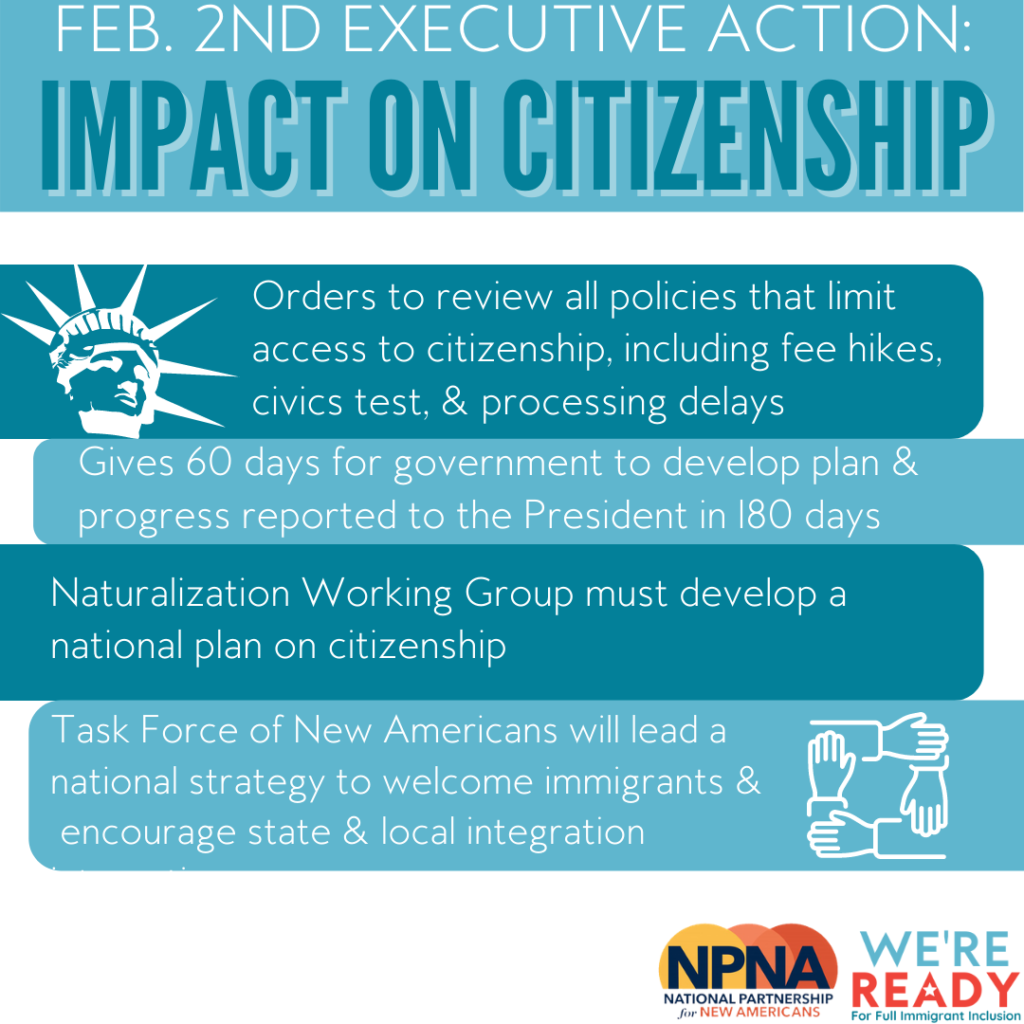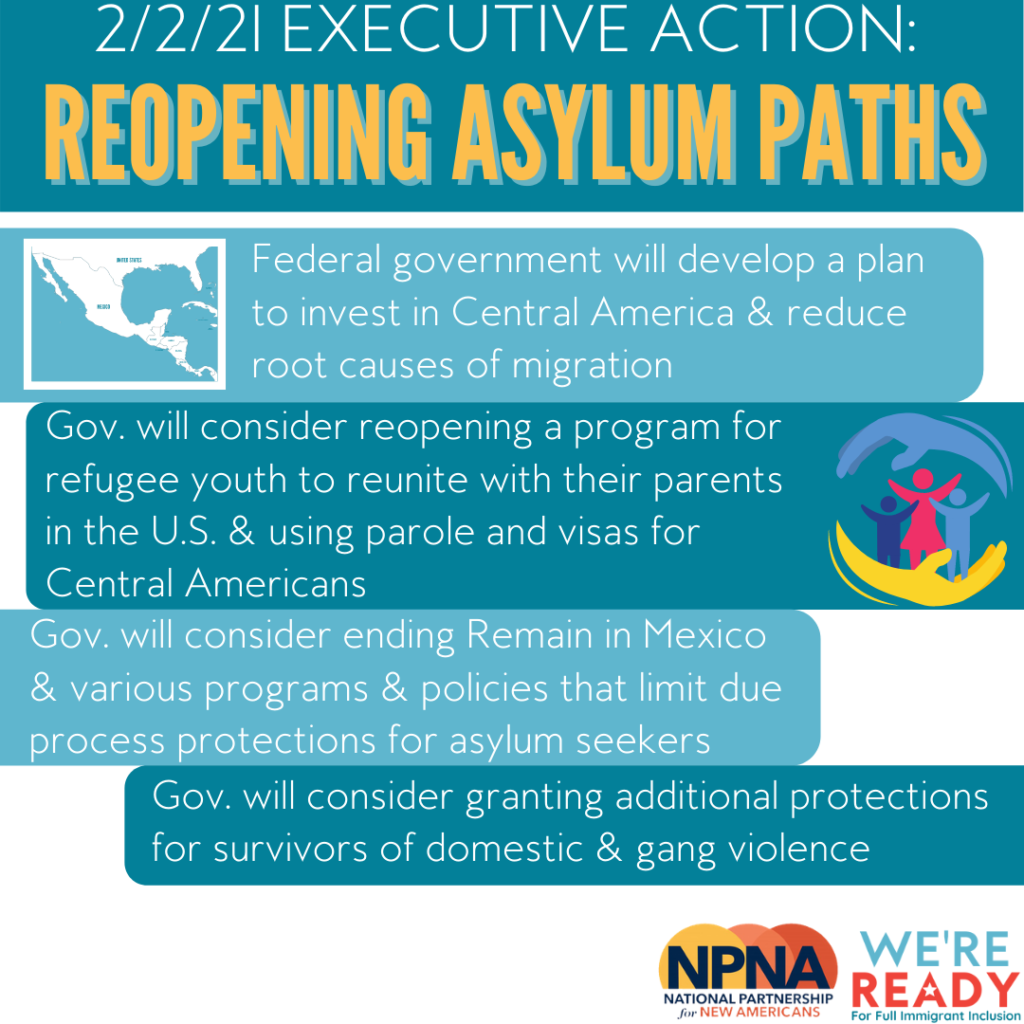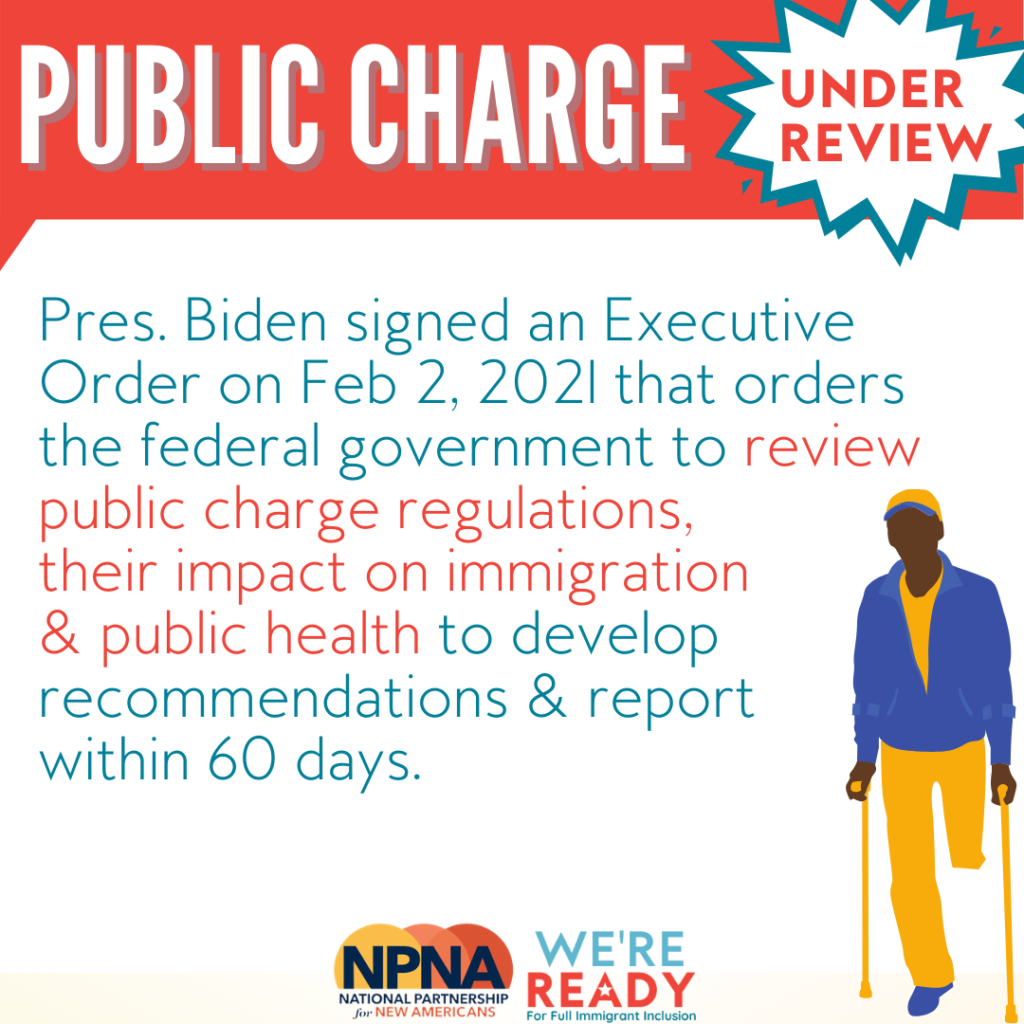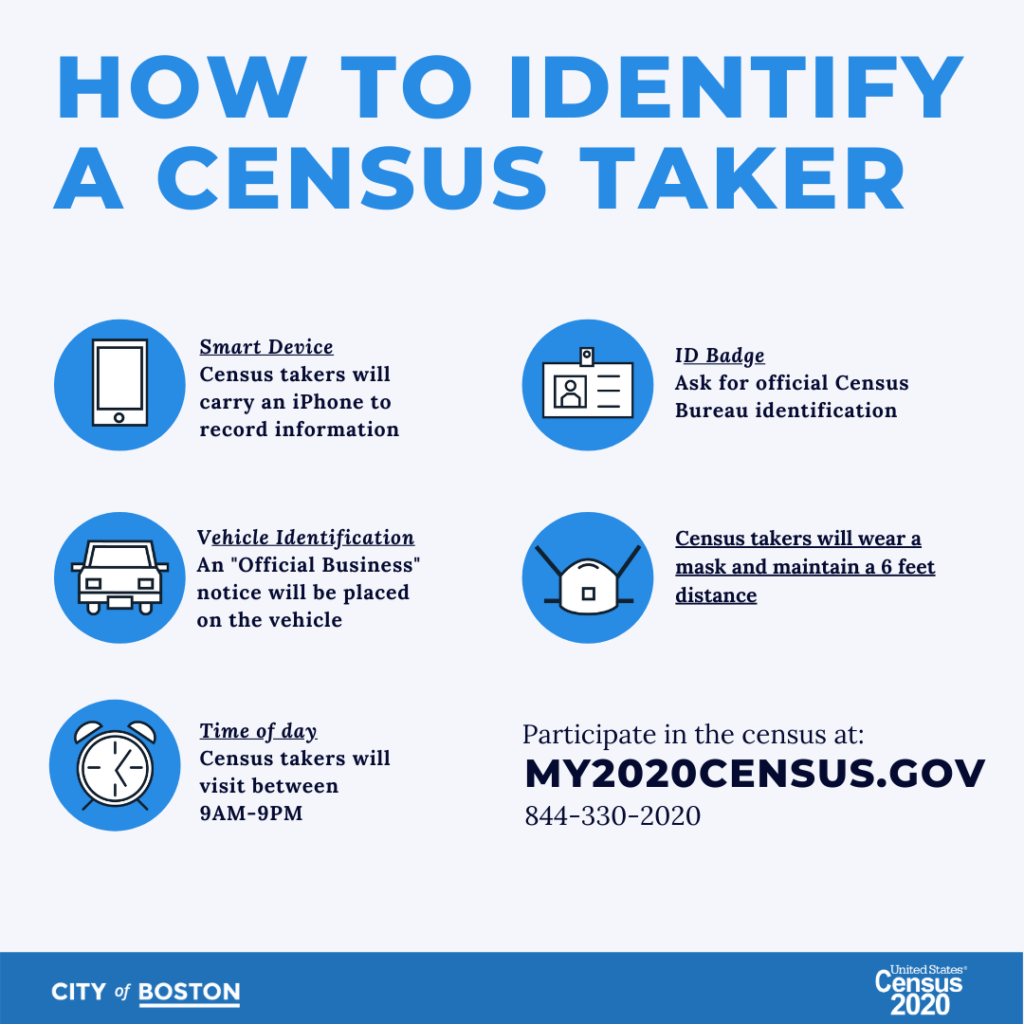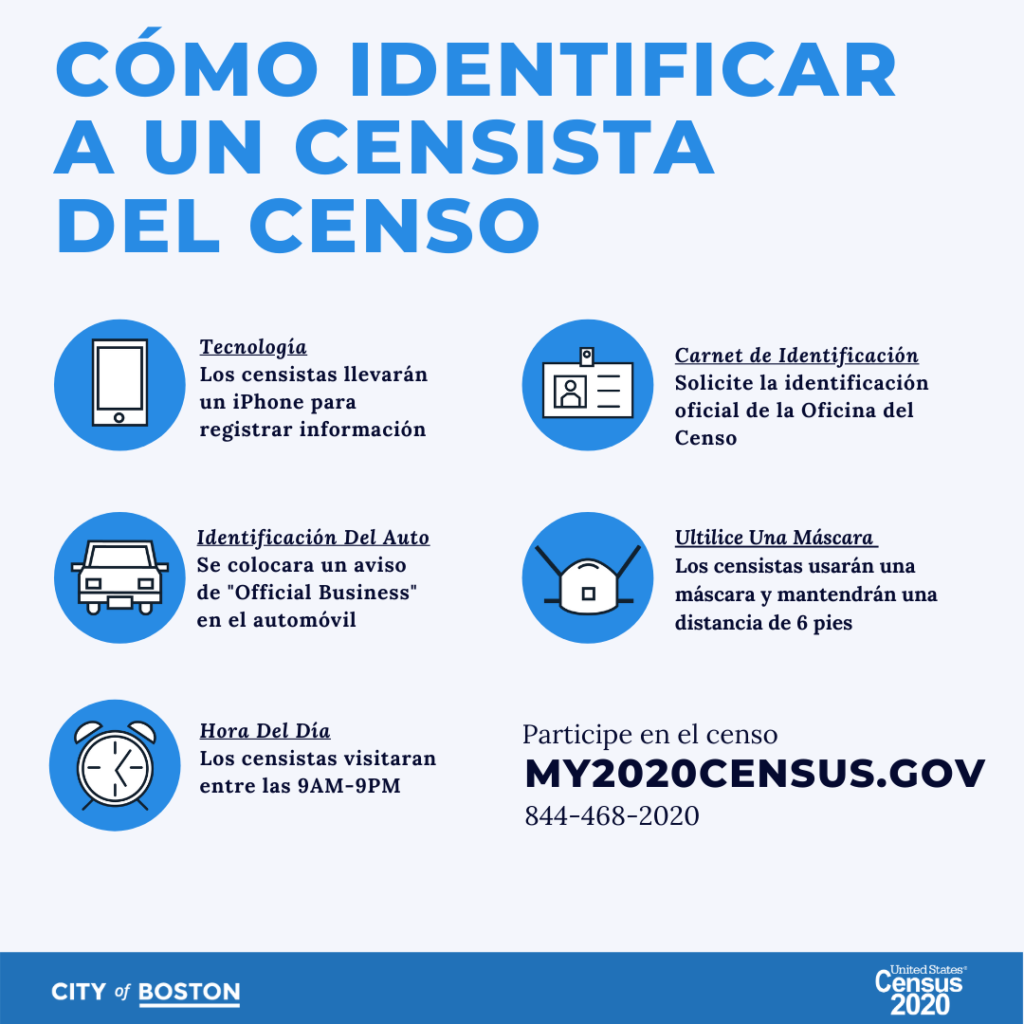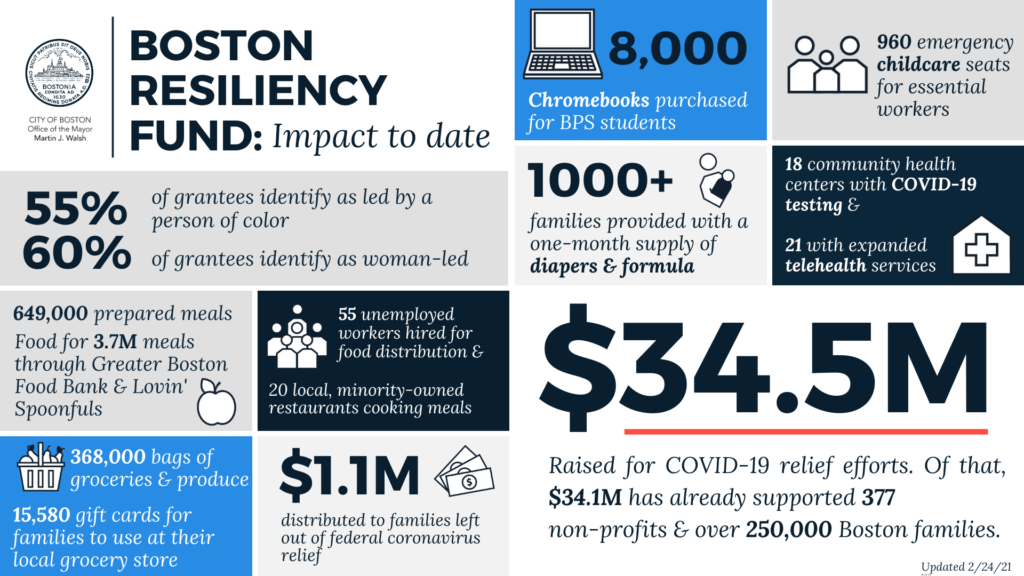
| Since its creation, the Boston Resiliency Fund has granted $34.15M to 377 organizations; Grantmaking to pause in anticipation of mayoral transition BOSTON – Thursday, February 25, 2021- Mayor Martin J. Walsh and the Boston Resiliency Fund Steering Committee today announced the Boston Resiliency Fund’s 28th funding round, totaling $3.85 million in funding to 62 nonprofits in Boston. The organizations in this round of funding work to ensure access to food and other basic needs for Boston residents and to promote public health in the city through community-based outreach and engagement. Since its launch in March of 2020, $34.5 million has been donated to the Boston Resiliency Fund (BRF), and 377 Boston-based organizations have received over $34.1 million in funding. “The Boston Resiliency Fund has been an invaluable resource in our efforts to support the critical services that Boston’s nonprofits have continued to provide throughout the pandemic,” said Mayor Walsh. “This latest round of grants is our biggest yet, and serves as our way to support these organizations for all the work that they do and for providing essential resources to our community year-round. I also want to thank the Steering Committee for their steadfast commitment to and oversight of the Fund.” In November, the Boston Resiliency Fund paused the rapid response grantmaking it had been doing since late March of last year to evaluate how the Fund could best serve Boston residents with limited remaining funds. The Fund received feedback from its non-profit partners that there was still an overwhelming demand for food and other basic needs, like diapers, formula and hygiene products, and that there was a need for further education regarding public health guidance and the safety and importance of the COVID-19 vaccine. Prioritizing these two focus areas, the BRF Steering Committee re-opened its grant application to any interested non-profit serving Boston residents. There were 137 applications seeking over $19 million in aid for this funding round. Of the 62 organizations awarded funds, 47% identify as led by a person of color, 66% as woman-led, and 30% as immigrant-led. Additionally, 42% identify as Black- or African-American-led, 18% as Hispanic- or Latinx-led, 13% as Asian- or Pacific Islander-led, and 18% as LGBTQI-led. Overall, 55% of all BRF grantees to receive funding to date identify as being led by a person of color, and 60% of grantees identify as woman-led. After this round of grants, the Fund has a remaining balance of approximately $400,000. The Boston Resiliency Fund, while not actively fundraising since the spring of 2020, has continued to receive donations from generous residents and groups around Boston. This will be the final round of BRF grants under Mayor Walsh’s leadership, and grantmaking will pause in anticipation of the mayoral transition. Grantmaking may resume in the future in order to equitably allocate any remaining balance. The BRF is hosted by the Boston Charitable Trust Fund, an existing 501(c)(3) designated trust fund managed by the City of Boston’s Treasury Department. The Boston Resiliency Fund Steering Committee includes Jack Connors, Jr., Anne Klibanski, MD, President and CEO of Mass General Brigham, and Jeffrey Leiden, MD, Ph.D., Executive Chairman of Vertex Pharmaceuticals. “Omega Men In Action, Inc. (OMIA) is a non-profit organization established to uplift and enhance opportunities for youth and families within the greater Boston communities. A key program is our emergency food pantry, which provides bi-monthly food distribution to families across Dorchester, Mattapan, Roxbury, Hyde Park and Jamaica Plain,” said Michael Munn, Board Member of Omega Men in Action. “The enormously appreciated assistance and funding that we received from the Boston Resiliency Fund is a Godsend. In addition to enabling the expansion of our food pantry, it will allow us to upgrade our refrigeration capacity, augment our delivery service to seniors, and distribute additional facemasks, hand sanitizer and other PPE.” “We are so grateful, once again, to the Boston Resiliency Fund for their generous support of our mission of providing access to healthy food to those impacted by COVID-19. This grant will allow us to cover our delivery fees so that we can expand home delivery of all of our products for at-risk customers, leveling the playing field for those who have been disproportionately impacted by the pandemic,” said Doug Rauch, Founder and President of Daily Table. “With this funding, the BRF has continued to show its deep commitment to food justice during these difficult times.” “Vaccine is love and is one way we can control this pandemic,” said Heloisa Galvão, Director of Brazilian Women’s Group. “This vaccination campaign is a collective effort to save lives and build the health of our community back. Vaccine NOW.” “Agencia ALPHA is thankful for the trust The Boston Resiliency Fund has deposited on our coalition. As grassroots organizations we are working hard to make sure our communities have access to the appropriate information about the COVID-19 vaccine as well to be vaccinated,” said Damaris Velasquez, Director of Programs Agencia ALPHA. “This is a step forward to empowering our communities to be part of the solution against this crisis.” “So grateful to Mayor Walsh, Yusufi Vali and the entire Resiliency Fund Team for their commitment in combating COVID-19 vaccine inequities among immigrant communities most disproportionately impacted,” said Reverend Dieufort Fleurissaint, Director of Haitian-Americans United. “This grant will increase our capacity to run a robust and comprehensive COVID-19 educational campaign aimed at dispelling the myths and the misinformation on the vaccine.” Brazilian Worker’s Group, Agencia ALPHA and Haitian-Americans United are part of the Immigrant COVID-19 Vaccine Campaign, coordinated by the Center to Support Immigrant Organizing. The community-based organizations addressing public health through COVID-19 prevention and vaccine education will receive $763,000. Another $2.82 million will be distributed to organizations expanding access to food and other basic needs and $258,000 will support organizations working to achieve both priority areas. About Fresh: About Fresh will utilize the grant from the Boston Resiliency Fund to fund an online ordering and food pickup program pilot. The aims of this pilot are to improve the shopping experience of vulnerable shoppers seeking to limit their exposure to winter weather and further minimize their potential exposure to COVID-19. Black Boston COVID-19 Coalition (BBCC) Community Support, led by Black Boston COVID-19 Coalition (BBCC): BBCC will continue to conduct contact and wellness checks, encourage residents to get tested and support access to vaccination sites for Black residents in Boston. BBCC will also create and share robust, culturally-competent messaging and ensure that residents are connected to existing resources. Boston Chinatown Vaccine Education and Basic Needs Relief, led by Boston Chinatown Neighborhood Center Inc. (BCNC): BCNC, the Asian Community Development Corporation, the Chinese Progressive Association and the Greater Boston Legal Services Asian Outreach Campaign will collaborate to provide essential resources regarding vaccine education and financial relief to the Chinese-speaking Asian immigrant community in Boston. Coordinating between organizations will maximize resources and enable them to align messaging and communication regarding the vaccine. Boston Girls Empowerment Network: Boston Girls Empowerment Network’s Culturally Responsive Support for Homeless Immigrant and Refugee Women will work across ethnic communities to coordinate and boost support services that include rental assistance and housing placement, immigration services, food and feminine hygiene products, mental health/wellness and case management support. Boys and Girls Clubs of Dorchester, Inc.: With the support of the Boston Resiliency Fund, Boys and Girls Clubs of Dorchester will increase Dorchester families’ access to nutritious food through an expansion of their current program and through weekly Grab & Go meals. Funding will be used to support the production and delivery of weekly grocery boxes to families. Bridge Over Troubled Waters: Bridge Over Troubled Waters will use BRF funding to provide homeless, runaway and at-risk youth, ages 14-24 with safety, food and basic needs, and hope for the future both through its Boston-based outreach, drop-in and housing programs. Bunker Hill Community College Foundation: Funding from this BRF grant will pay the salary ofa delivery driver contracted to BHCC from the New England-based culinary organization Snap Chef. The BRF grant will enable them to continue to leverage the existing online ordering system to increase the accessibility of food through the delivery system developed at the beginning of the pandemic. Cathedral Church of St. Paul: The Cathedral Church of St. Paul will continue providing weekly meals to the unhoused people they serve. Additionally, they will continue to provide water, access to bathrooms, PPE for staff and guests, phone charging outlets, and information about and assistance accessing other resources for the unhoused in the city. Catholic Charitable Bureau of the Archdiocese of Boston, Inc.: Catholic Charities will use resources from the Boston Resiliency Fund to support its two Boston food pantries and to address the continued and expanded demand for food in low-income communities. Thetwo pantries serve approximately 4,000 people each week. Immigrant COVID-19 Vaccine Campaign, led by Center to Support Immigrant Organizing: The Center to Support Immigrant Organizing will collaborate with other organizations to use this BRF grant to develop messaging, education and outreach strategy regarding the COVID-19 vaccine. Central Assembly of God Church, East Boston: The Central Assembly of God Church will use the Boston Resiliency Fund grant to continue to close the food insecurity gap experienced by Boston residents experiencing joblessness. Chica Project: BRF funds will help Chica Project continue to provide stipends to Peer Leaders, and training to mentors as they continue to offer a targeted micro-public health campaign/community forum that improves public education for Latinx girls and other young women of color about how to prevent COVID-19. Community Work Services: Community Work Services will address the rapidly increasing community need to provide nutritional support to food-insecure individuals during this public health crisis by delivering food to families among the most impacted by COVID-19 by partnering with local church networks across the City of Boston. Daily Table: Daily Table will use BRF funding to subsidize the delivery fees for customers and others who have been disproportionately impacted by the pandemic. Daily Table plans to offer free delivery to these customers to ensure access to healthy, affordable food without additional risk to COVID-19 infection. East Boston Community Soup Kitchen: East Boston Community Soup Kitchen will use this BRF grant to address the additional needs of their guests during the COVID-19 pandemic by modifying the way they provide meals by incorporating a take-out format and increasingly, gift card distribution. They will use the funds to purchase items from food warehouses at a discounted rate to provide a good variety of food items to the soup kitchen’s guests. East Boston Neighborhood of Affordable Housing, East Boston Neighborhood Health Center and East Boston Social Center: The ‘Stronger Together’ team will provide nutritious food relief to East Boston households (including seniors and families). Their program will continue to purchase quality fresh produce and culturally appropriate dry goods from both The Greater Boston Food Bank and Costa Fruit and Produce in Charlestown. Eastie Farm: Eastie Farm will use BRF funding to continue their work providing prepared meals, dairy, and meat to Boston residents and expand their outreach efforts. Elizabeth Stone House, Inc.: Elizabeth Stone House will use BRF funding to support residents facing housing and food insecurity, ensure access to critical medical care and opportunities for COVID-19 vaccine administration, provide safe and hygienic emergency housing and keep front-line staff protected and able to provide critically important domestic violence counseling and safety planning services. Ellie Fund: Ellie Fund will use this BRF grant to support their Breast Cancer Patient ServicesProgram, which distinctly serves both curative and metastatic (lifelong) patients, who are immunosuppressed, physically weakened, and more susceptible to contagious illnesses. This program provides essential non-medical services for these patients undergoing costly breast cancer treatment amid the pandemic. Services include nutrition and food assistance, transportation, childcare, house cleaning, and integrative therapies, free of charge. FamilyAid Boston: FamilyAid Boston (FAB) will use grant funding to build awareness, education and support for obtaining vaccines for Boston residents. FAB will provide vaccination roll-out support with clients. Family Nurturing Center of Massachusetts: A third grant from the Boston Resiliency Fund will support the direct aid to families in Dorchester, Roslindale and Hyde Park in the form of gift cards for groceries and other basic needs. Fair Foods Inc: Fair Foods will use this grant to sustain their weekly efforts at food distribution sites across the city and continue to grow its $2 dollar bag sites all over Boston. In addition, Fair Foods has enlisted new and expanded distribution partners, such as Maverick Landing Community Services (MLCS) in East Boston and other partners in Dorchester and Mattapan. These partners pick up food boxes at the Fair Foods warehouse in South Boston and conduct deliveries across the city. Fenway Civic Association: (Fiscal Sponsor: Fenway Community Center): Fenway Civic Association will use BRF funding to support their work with the Fenway Cares mutual aid collaborative, which serves all Fenway residents and visitors who attend or sign up for food distributions. Fenway Civic Association will distribute food boxes and other items, including hand sanitizer and PPE, in bi-weekly distribution events and associated deliveries. Freedom House, Inc.: Freedom House will use the Boston Resiliency Fund grant to address food insecurity and provide PPE and COVID information to the community. Friends of the Children-Boston: Friends-Boston will use this BRF grant to provide resources in the form of store credits, allowing direct access to food and household supplies for children, youth, and family members. They will partner with up to five bodegas and/or small and mid-size grocers that are walkable to where families live and that offer a variety of fresh food and household cleaning supplies. Fundo Arcu: Fundo Arcu will use this BRF grant to provide boxes of ethnically competent food boxes, diapers, cleaning products, laundry products and personal hygiene products for women and men in the Dominican/Latinx community. Vaccination Without Barriers/Sin Barreras, led by Greater Boston Latino Network: With BRF support, GBLN will strategically realign their ongoing COVID-19 prevention campaign to focus on vaccination and emerging trends such as viral variants. The campaign will deepen and expand its focus on prevention and protection while providing direct resources including, but not limited to, free masks, food, gift cards, unemployment assistance, eviction prevention and medical referrals. Greater Love Community Cares: With the grant from the Boston Resiliency Fund, Greater Love Community Cares will provide periodic food distribution and food deliveries to certain seniors and residents who are home-bound. Grove Hall Neighborhood Development Corporation: Grove Hall Neighborhood Development Corporation requested BRF funds to support their work combating the spread of COVID-19. Grove Hall NDC will clean local church buildings and non-profit locations who are open for essential services and provide hand sanitizer for Boston residents. Haley House: Haley House will use this BRF grant to continue supporting the increased level of emergency services they are currently offering. Specifically, funding will be used to purchase food beyond their donations from the Greater Boston Food Bank and Lovin’ Spoonfuls, take-away materials, extra cleaning/sanitization supplies, and increased operating costs for increased services (e.g. trash, utilities for outdoor heaters). Hawthorne Youth and Community Center, Inc.: The Boston Resiliency Fund grant will be used to support home delivery of fresh produce, shelf-stable foods and grocery store gift cardsto high-risk residents. Additionally, it will allow for the home delivery of cleaning supplies, PPE, and hygiene items, as well as the distribution of current COVID-19 vaccine information to Highland Park residents. Boston youth will be engaged in food distribution and farming activities. Hope & Comfort, Inc.: Hope and Comfort will use this BRF grant to distribute hygiene products in Boston. The primary items distributed will be bars of soap, in order to support personal hygiene to help contain COVID-19. Soap distributions will be accompanied by other hygiene products, including toothbrushes, toothpaste, deodorant, shampoo, and more, to ensure youth and families have comprehensive hygiene access. Java with Jimmy: Java with Jimmy will use the BRF grant to continue to curate conversations that promote CDC, State, and Local guidance to stop the spread of COVID-19. They will expand their outreach to share information by creating public service announcements to promote the availability of COVID-19 related services. Java with Jimmy will also partner with local entities and organizations to host the “pop up” community giveaways, providing nonperishable foods and/or gift cards. John F. Kennedy Family Services: This BRF grant will allow JFK Family Service Center to add temporary staff and distribute critical supplies, as well as provide internet-basedservices to their clients. The JFK CARES project is a continuation of their multi-pronged efforts to provide assistance to meet the basic needs of those struggling during the pandemic. Lifeboat Boston: Lifeboat Boston will continue to provide nutritional support to families withinfants through the distribution of infant formula, diapers, cleaning supplies, and hygiene products. Love Your Menses, Inc.: Love Your Menses will continue using Boston Resiliency Fund grant funds to purchase menstrual hygiene and postpartum items to support girls, women, and new moms. They will also continue installing period product dispensers at local community organizations. Louis D. Brown Peace Institute: The Peace Institute will use this BRF grant to support The Live in Peace Fund. This fund ensures that Boston’s families, children and seniors get the food security, clothing and other necessities that they deserve through gift cards and vouchers. Madison Park Development Corporation: MPDC will utilize an additional Boston Resiliency Fund grant to sustain its weekly food distribution efforts, currently serving approximately 380 households within its affordable housing portfolio/programs. Massachusetts Immigrant Collaborative (MIC) Emergency Relief Fund: MIC will provide access to emergency cash, food assistance and other basic needs, including diapers, formula, cleaning supplies, and hygiene products. Funding will be allocated equally across the eleven participating partner organizations, each of which will distribute assistance according to the unique cultural and logistical needs of the communities they serve. |

